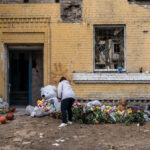Oleksandr Polishchuk knows suffering more than most.
He lost friends after joining the Ukrainian Army in 2015 when Russia invaded eastern Ukraine. He lost his first wife to the pandemic. In 2022, shortly after the Russians launched their full-scale invasion, he was captured and lost his freedom for 100 days. As a prisoner of war in the damp, dark basement of a makeshift prison in a former shoe factory, he lost part of his eyesight.
But Mr. Polishchuk also knows how to cope. He remarried and had a daughter. He went to work at a recycling center. When air-raid sirens woke the family early Thursday morning, Mr. Polishchuk threw on his robe, wrapped his 2-year-old in a blanket and ran for the basement. He had done this almost every night of her life, after every siren.
This time, he never made it.
The missile hit before Mr. Polishchuk could get there, leaving him clutching his toddler in a pile of rubble, both alive. The weapon, which Ukrainian authorities say was manufactured by North Korea, had slammed into the balcony where, just days before, the family was grilling marinated pork cutlets to celebrate the 44th birthday of Mr. Polishchuk’s wife, Anna Polishchuk.
The explosion killed 13 people and injured almost 90, the deadliest attack in the capital, Kyiv, since last summer. For this article, The New York Times talked to more than a dozen family members, neighbors and friends of the victims, a tight-knit, decades-old community now blown apart.
The building was constructed during World War II, and the people who lived there were as much family as neighbors. Its residents were given their apartments during Soviet times. Most of them stayed for decades. Children grew up and left and came back. Elders died. Other relatives moved in.
“This building was born because of the war, and another war destroyed it,” said Oleksiy Kasian, 47, a close friend of Mr. Polishchuk’s who also grew up in the neighborhood.
For President Trump, this attack stood out more than others. Coming at a crucial time in negotiations to end the war, Mr. Trump posted on Truth Social that the Russian strikes were “not necessary, and very bad timing.” He rebuked President Vladimir V. Putin of Russia, a man he has more often praised as a strong leader, writing, “Vladimir, STOP!”
After the missile strike, Sergey V. Lavrov, the foreign minister of Russia, said Moscow targeted only “sites which are used by the military.” Russian officials have made similar comments after strikes hit a children’s hospital in Kyiv, a playground in Kryvyi Rih and an orphanage in Sumy. More than 13,000 Ukrainian civilians have been killed in the war.
There were no outward signs that Mr. Polishchuck’s building was being used by Ukraine’s military. It was a low-slung, crowded building painted in a cheery yellow. A smiley face and the word “smele” (a misspelling of “smile”) were graffitied near one of the front doors.
During Soviet rule, the state parceled out the building’s 12 apartments to people who worked in the nearby Antonov aircraft plant, a perk of Communist times. Mr. Polishchuk’s parents worked at the factory. They got Apt. 10.
Families often wanted to leave buildings like these, referred to as “barracks” or “the two-story buildings,” and into nicer ones. When the Antonov company built taller buildings nearby, the waiting list filled up fast.
After the nuclear accident in Chernobyl, Ukraine, in 1986, the new apartments went to people affected by the disaster and to workers who helped with the cleanup. By the time the Soviet Union fell apart and Ukraine declared independence in 1991, the families at the “barracks” were dug in.
Mr. Polishchuk lived in the building for nearly all of his 46 years. His apartment had just three rooms. He, Anna and their daughter, Oleksandra, shared one, sometimes joined by Anna’s 19-year-old daughter. Relatives stayed in the other rooms.
Friends in other apartments also lived with their extended families. At least two residents were in the military. Oleksandr Maisiura, a border guard who had worked hard to get Mr. Polishchuk out of captivity, had just returned from the front lines because he needed a heart operation.
Oleh Hudya, a soldier injured on the front lines three months earlier, lived on the first floor with his wife, their 17-year-old son and 14-year-old daughter. There was also a doctor and his two adult children, 19 and 21. A 27-year-old aesthetician and her husband. A 33-year-old locksmith. A 84-year-old pensioner, who lived with her cat.
The missile hit after 1 a.m. Thursday. Mr. Polishchuk had made it to the doorway of his apartment, which had a thick, load-bearing wall. As the building collapsed around him, the doorway and the falling wooden beams formed a kind of shelter protecting him and Oleksandra from the worst of the rubble. He huddled over her, trying to shield her from the dust.
“When the dust cleared a bit, I turned to my left — and there was nothing there, just a huge crater,” Mr. Polishchuk later said. He added: “It was utterly dark, and I could only see the sky and the stars. I saw the neighboring high-rise building. At that moment, so many people were crying for help from the windows. It was terrifying — people shouted for help everywhere, begging to be rescued. It overwhelmed me even more, although I’m generally not afraid of such things.”
Mr. Polishchuk’s neighbors spotted him. Olena Khirkovska, 57, an accountant who had planted petunias the day before, and her husband, Ihor Khirkovsky, ran over. Mr. Khirkovsky took the toddler in his arms, while Mr. Polishchuk climbed out of the rubble.
Covered in dust and wearing only his robe, Mr. Polishchuk then cradled Oleksandra and walked the 10 minutes to the nearest subway station to hide in the shelter in case of more missiles. He had no shoes. Oleksandra wore only a diaper. Hours later, Mr. Kasian, Mr. Polishchuk’s friend, found him and his daughter in the subway still covered in dust.
Later Thursday, they would learn that Anna Polishchuk had died in the strike. So had Mr. Hudya, the injured soldier; his wife and their 17-year-old son; Mr. Maisiura, the border guard; the doctor’s two children; the locksmith; the aesthetician; and the pensioner.
“In this building, everyone knew each other,” Mr. Polishchuk said. “It feels like I lost my whole extended family.”
Mr. Kasian and his wife are now helping care for Oleksandra. They are raising money to buy the basics, like diapers and baby food. Mr. Polishchuk is sleeping in a bunk at the aluminum-recycling plant where he works. He said he will start over again — find a new home, and then care for Oleksandra on his own.
On Saturday afternoon, Halyna Sosiura, 69, wearing a white bathrobe and tan loafers, walked over to the pile of rubble and sobbed, staring at what was gone. She and Ms. Polishchuk had been friends. They held vigil together when Mr. Polishchuk was captured by the Russians.
“Oh, my God, she was there, she was there,” said Ms. Sosiura, tears streaming down her face. “Oh, my God, and he survived captivity, and we prayed together for him. And now he survived with the child, but she’s gone. How can one survive here? How can anyone survive?”
Nataliia Novosolova contributed reporting from Kyiv.











More Stories
Clashes Erupt in Damascus Outskirts, Killing 9
U.S. Navy Jet Sinks Into Red Sea After Falling Off Aircraft Carrier
Three Takeaways From the Times’ Interview With President Alexander Stubb of Finland